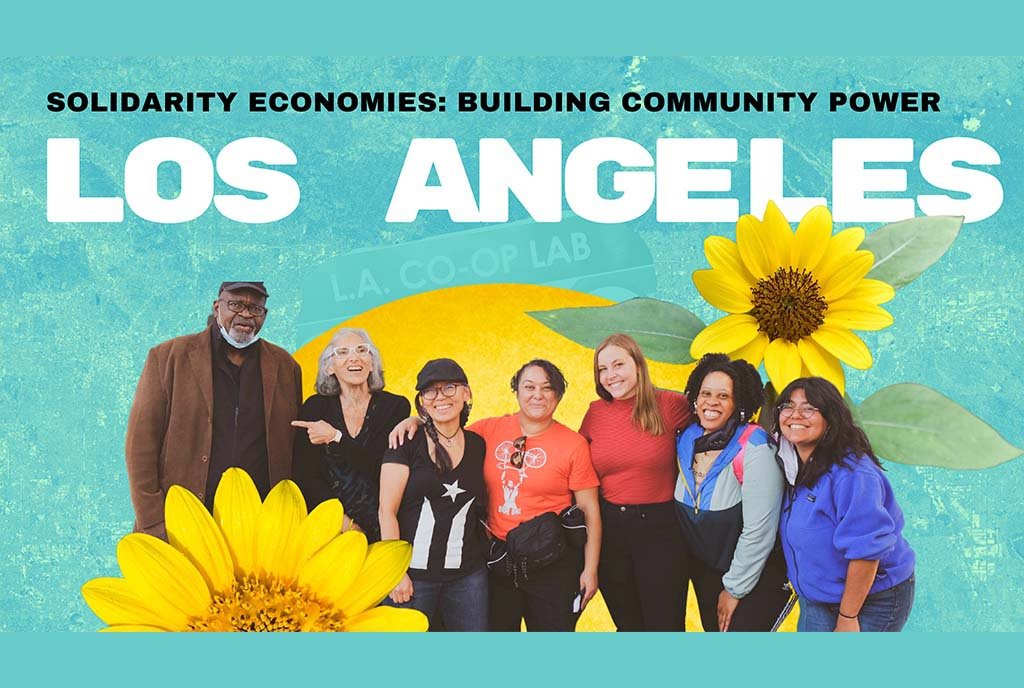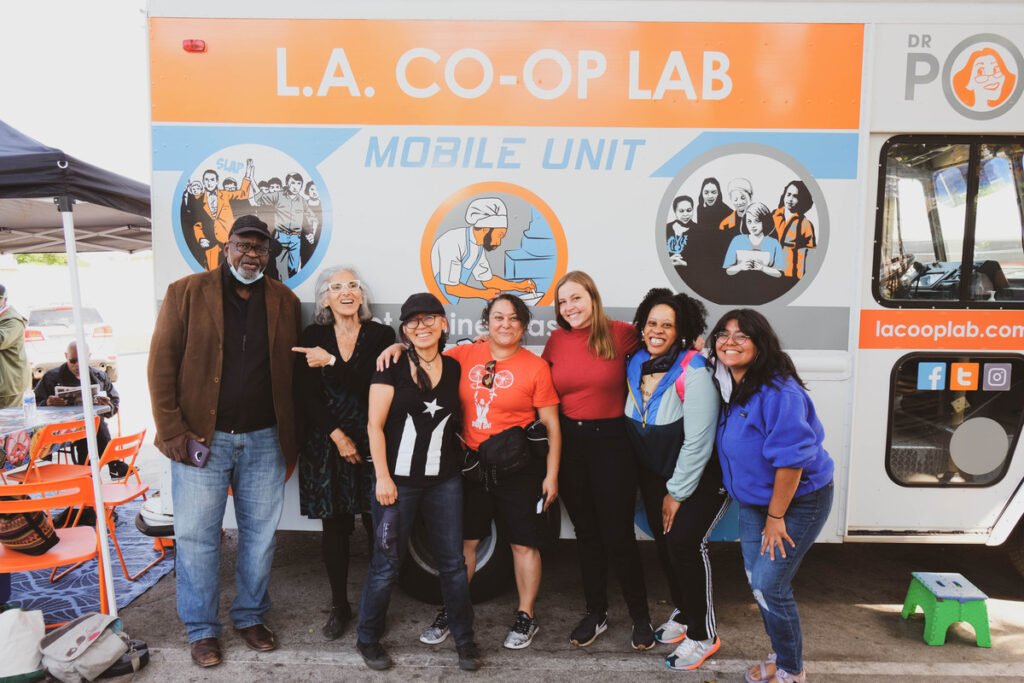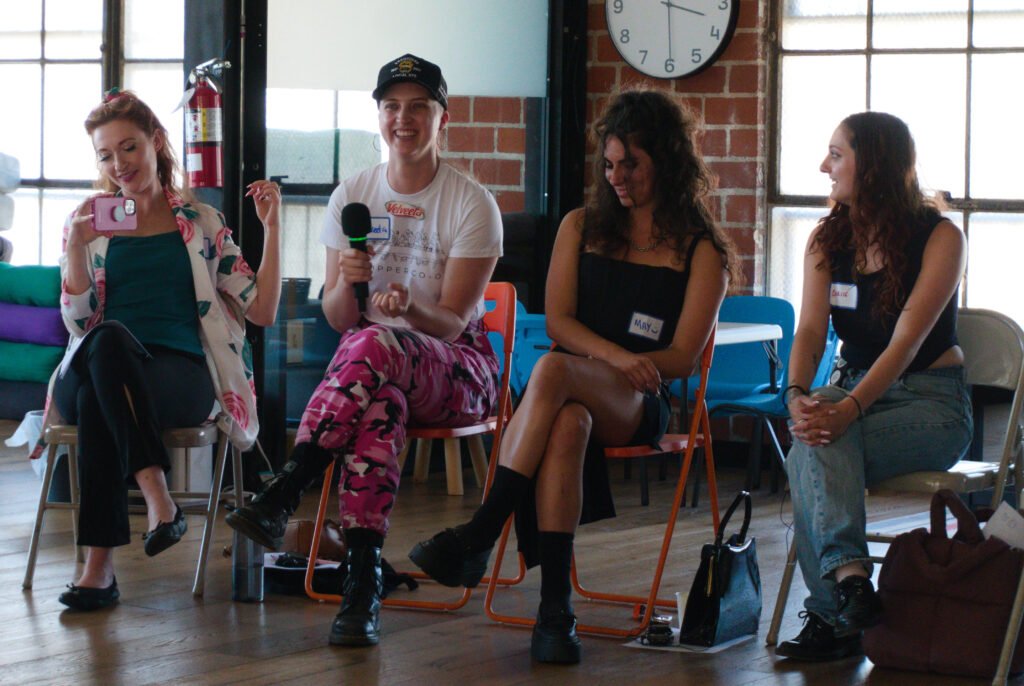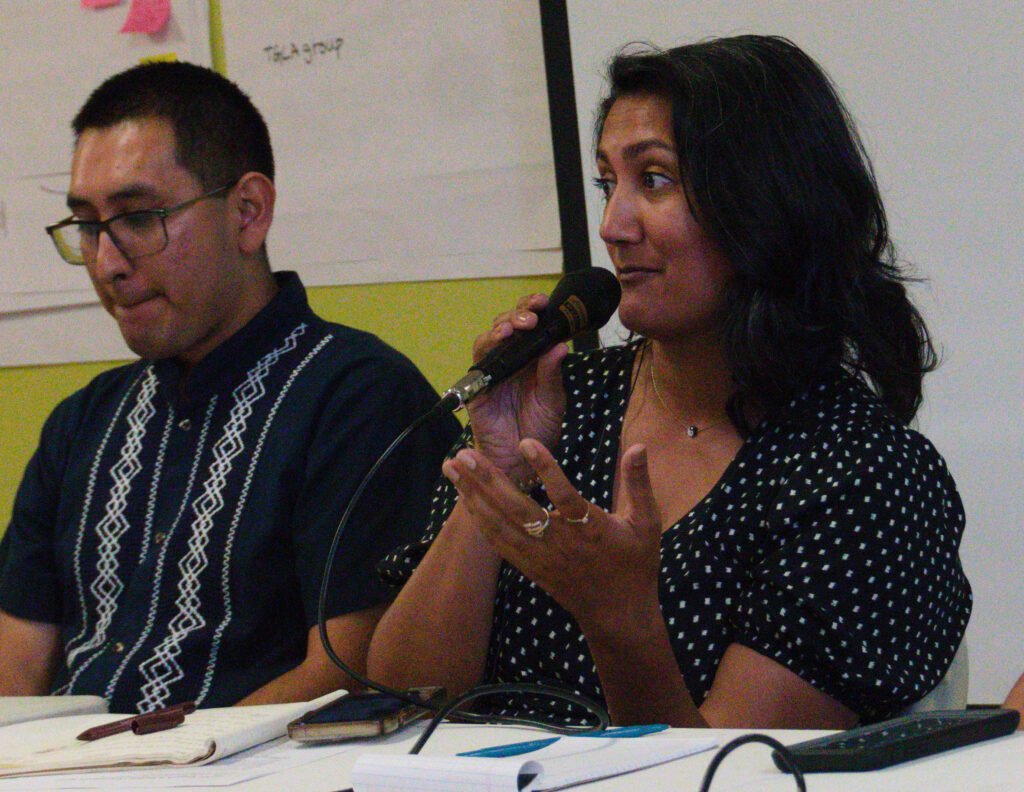
This is the third article in NPQ’s series, Solidarity Economies: Building Community Power. Coproduced with the New Economy Coalition—a coalition of over 100 organizations building the solidarity economy in the United States—this series highlights case studies of solidarity economy ecosystems that are returning wealth and building grassroots power in cities across the country.
Spanish language version, translated by María Luisa Rosal and edited by Lila Arnaud, members of the BanchaLenguas Language Justice Collective is available here. Versión en español, traducido por María Luisa Rosal y eidtado por Lila Arnaud, integrantes de la Colective de justicia de lenguaje BanchaLenguas está acesible aquí).
The summer of 2023 was Los Angeles’s “hot labor summer.” Rolling strikes by hotel and airport workers disrupted conventions and airport concessions in the city’s busy tourist season. The Hollywood writers’ strike expanded as film and television actors also left the job in July. Less noticed, at the same time, other workers in Los Angeles were organizing for worker ownership—pushing back against inequity, gentrification, and the gig economy by collectively creating their own jobs and meeting community needs.
Those workers are concentrated in a wide range of service industries where wage theft has proven to be a reliable business model and enforcement of labor rights is rare. And often, immigrant workers and workers of color are most directly impacted. Their movement toward a solidarity economy is where L.A. Co-op Lab comes in.
Formed in 2015, L.A. Co-op Lab was created to explore and invent ways to build Los Angeles’s capacity for worker ownership as a pathway toward a more equitable and democratic economy. When we began, worker co-ops in Los Angeles were unheard of; now, they are increasingly common.
As a long-time volunteer for the L.A. Co-op Lab, our story, in short, is about a solidarity economy ecosystem in development. There are some key lessons that we have learned: 1) link with national organizations (a national loan pool has been particularly helpful); 2) create “open door” processes for workers to propose new co-op ideas; 3) provide spaces for peer learning and information sharing; and 4) join with others (in our case, immigrant worker centers) to expand scale and capacity.
The Co-op Lab Idea
What began as a one-time Antioch University capstone course became the L.A. Co-op Lab collective.
The seeds of L.A. Co-op Lab were planted at a project-based residency called the Big Question Lab at Antioch University, where I taught. In one of those sessions, I introduced the possibility of worker cooperatives to a small cohort of graduate students and faculty. We watched a video of co-op movement organizer, intellectual, and griot Ed Whitfield’s “Other Side of the Door” keynote at a 2014 New Economy Coalition conference and then talked to him about it on the phone.
Sold on the co-op idea, three graduate students agreed to design a shared capstone project on what it would take to build local capacity for worker cooperatives. They called their project L.A. Co-op Lab.
At that time, it would be fair to call Los Angeles a worker co-op desert. We knew of only one worker cooperative in the city—the fledgling Courage Homecare co-op housed at the Pilipino Workers Center.
Eventually, the project included a field trip and lunch with key players of the Bay Area’s several dozen co-ops, hosted by my friend and colleague (and then student) Gopal Dayaneni at his cooperative home in Oakland. Business models of co-op developers, including The Working World (which would later help launch the Seed Commons lending network, described below), Arizmendi Association of Cooperatives, and WAGES (now Prospera), were taken apart and examined against what we knew about Los Angeles.
We designed our research products to be of service to local organizations. This included an annotated bibliography of worker cooperative curricula for CD Tech (a South Los Angeles-based nonprofit behind Los Angeles Trade-Technical College’s community organizing and development program); a study of opportunities for a construction trade cooperative for the Los Angeles Black Worker Center; and a Cooperatives 101 Workshop for the Courage Homecare worker co-op members.
It was an enthusiastic, tiny class—which, of course, ended. But the three students who graduated wanted to continue the work, as did I. As a result, what began as a one-time Antioch University capstone course became the L.A. Co-op Lab collective.
Distributing ownership and wealth was still foreign to most Angelenos. Thus, the early years…were devoted to outreach and education.
Building a Solidarity Economy Ecosystem
Despite our nascency, we had the opportunity to join forces with other solidarity economy aspirants nationwide to build a financial cooperative, now known as Seed Commons, that could help finance our efforts. The ability to finance projects, especially along Seed Commons’ non-extractive model, was a game changer. It could make the difference between good ideas and sustainable economic projects.
However, the idea that worker co-ops were a method for realizing economic justice by distributing ownership and wealth was still foreign to most Angelenos. Thus, the early years at L.A. Co-op Lab were devoted to outreach and education through pop-up events and workshops that gradually evolved into an articulated curriculum. That curriculum has been tested, adapted, and overhauled in community spaces, at Los Angeles Trade-Technical College, at UCLA, and online.

One of the more effective strategies was the use of free office hours to reach workers. Use of office hours tripled during COVID when everything went online, as the existential challenges of COVID got more people thinking seriously about their relationship to work.
It was during office hours that several relationships with the newest worker co-op businesses got started. For instance, Black and Latinx yoga instructors told us they were frustrated by the lack of yoga studios in Los Angeles where people looked like them. Teams of chefs confided that even if their restaurant reopened, they could not abide one more day of toxic kitchen culture. Cannabis workers and advocates who had been pushing back for years against the “War on Drugs” and its disastrous attack on Black and Latinx people saw that once cannabis was legalized, only the usual suspects (White, wealthier people) would benefit. Strippers who dreamed of dignified work if only they could own the “means of seduction” also showed up at L.A. Co-op Lab office hours.
One of the more effective strategies was the use of free office hours to reach workers…It was during office hours that several relationships with the newest worker co-op businesses got started. All these people—and more—engaged with our online courses, came back, invited us to their events, and created co-ops. For example, some chefs did pop-ups and catering jobs as an emerging cooperative called Public Access. Meanwhile, Cage-Free Cannabis is now a cooperative company that advocates for the producers who have been most impacted by the War on Drugs while providing livelihoods to others.
Sign up for our free newsletters
Subscribe to NPQ's newsletters to have our top stories delivered directly to your inbox.
By signing up, you agree to our privacy policy and terms of use, and to receive messages from NPQ and our partners.
The Tree Yoga Cooperative now provides yoga and wellness resources in a safe, supportive, liberating space for a Black and Latinx customer base. They are transforming the face of the city’s thriving yoga scene while at the same time producing trauma-informed healing programs for historically disenfranchised communities.
As for the strippers, when dancers from the Star Garden club were locked out of their workplace for organizing against wage theft and unsafe working conditions, they unionized, drove the club owner into bankruptcy court, and then used the power of that leverage to win back better pay and working conditions. They formed Stripper Co-op LLC, which continues to organize pop-up shows and is building toward the day when the dancers can support their dancer-owned venue.

Connecting with Worker Centers
Another key part of L.A. Co-op Lab’s work involves connecting with worker centers. Worker centers, which focus on supporting workers of color and immigrant workers across the United States, are especially strong in Los Angeles. These centers had already built democratic practice, deep relationships with workers, and visions of what a solidarity economy could offer them—and had also formed their own solidarity network.
Worker centers often focus on industries whose business models thrive on wage theft and other workplace abuses of vulnerable workers—especially immigrant women of color. They address their members’ immediate needs while building the leadership and power essential to transforming lives and the economy. They fight and win wage theft settlements; they organize for and win legislation. Lately, building on the power and logic of that work, they have begun to organize cooperatives.
One example is CleanWash Mobile LLC, a mobile worker-owned cooperative incubated in the CLEAN Carwash Worker Center. CleanWash specializes in services to fleets, biodegradable, safe products, and reduced water use. Executive Director Flor Rodriguez recalls how they got started:
Car wash workers at the center were tired of the fact that no matter how many years they worked at a car wash, they couldn’t move up the ladder. At car washes, new workers usually get placed in soaping or vacuuming the vehicles. It takes years before you can dry cars and earn tips—or move up to more hours and larger tips as a detailer.
However, there were experienced detailers within the worker center’s membership who agreed to develop a training for others, which quickly became a program. Graduates would then become trainers themselves.
Gradually, these skilled trainers started saying, “All we’re missing is to own our own car wash!” and began to explore different ownership models, learned about co-ops, got their first grant, and registered CleanWash as a co-op.
CleanWash Mobile is a pilot of a larger plan to transform the industry by replicating their co-op model and, in that way, demonstrating that washing cars can provide a dignified, skilled, and living-wage livelihood for industry workers.
Similarly, along these lines, the Pilipino Workers Center has embarked on an ambitious long-term design process, accompanied by what Executive Director Aquilina Soriano Versoza calls a “dream team” of allies from cooperative development and labor. Together, building from many years of experience and inspired by Courage co-op’s example, they intend to create a network of homecare cooperatives across California that can share a brand, marketing, and back-office services. Like CleanWash, the goal is to achieve a distributed version of scale that can impact the growing (and exploitative) homecare market.
The Garment Worker Center (GWC) is also working with L.A. Co-op Lab—along with the Democracy at Work Institute, a national nonprofit that supports worker cooperatives—to form a staffing cooperative that will be owned by garment workers and contract with manufacturers who are willing to pursue a “high road” approach to garment production. GWC aims to transform an industry in which Los Angeles is the largest producer in the country and whose $1.5 billion in annual revenue is largely earned on the backs of tens of thousands of immigrant workers, many of whom face wage theft and other workplace abuses.
The Path Ahead
So where does all this leave us?
In terms of cooperatives, the number of worker-owners in Los Angeles can still be counted in the hundreds. But that is not the last word on the question of scale.
The movements upon which these cooperatives are being built already involve many thousands. The distributed growth model that their worker-architects envision is nimbler and more flexible than conventional corporations. It may thus prove more sustainable.
The magic of this moment is most palpable when these disparate threads come together and can be seen as one. An example occurred earlier this year when people from Cage-Free, GWC, Strippers LLC, Tree Yoga, L.A. Co-op Lab, and visitors from Seed Commons met at Proof. This neighborhood bakery converted to a worker co-op with the help of an encouraging employer and Project Equity, a California-based nonprofit that supports conversions to employee ownership. It only took a moment before Charlee from Star Garden signed up as a volunteer for a Cage-Free expungement workshop and then later asked Nayantara Banerjee from GWC for a higher-road source for Stripper Co-op LLC’s promotional t-shirts (the answer was EthixMerch).
Over coffee and Proof pastries, Banerjee celebrated the moment by saying: “Some of my favorite and most healing things in life include dance, yoga, cannabis, food, and fashion.”

All of this is why so many Angelenos—at L.A. Co-op Lab and beyond—are now betting that as the work advances, many more in our city will also enjoy the opportunity to heal and learn. From these seeds of imagination, commitment, and experimentation, a brave new wave of solidarity is emerging.












